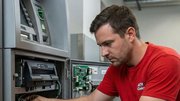News
Are E*Trade ATMs for sale?
According to persistent industry rumors, E*Trade Access is looking to sell at least some of its ATM portfolio. An E*Trade spokesperson acknowledged that the company is reviewing its long-term plans for the network but said no decisions on a sale have been made.
May 27, 2004
The retail ATM business has grown to resemble a high-stakes game of musical chairs over the past few years, with ATM portfolios changing hands at an increasingly accelerated pace.
One of the industry's biggest moves yet may soon take place, before the end of the second quarter if persistent rumors are true.
E*Trade Access, one of the country's largest ATM deployers with some 15,000 ATMs under contract, is reportedly ready to sell its portfolio to one or more deployers. E*Trade was a major acquirer itself as recently as February of 2003, when it bought some 4,000 ATM contracts from XtraCash ATM.
Under review
Although she declined to say whether the network is for sale, an E*Trade spokesperson said, "While we think the ATM network is an important part of our distribution channel, we are currently reviewing the long-term viability of E*Trade continuing to operate the network."
She added, "It's my understanding that we are not set on anything at this point but are reviewing several different scenarios," including continuing to operate a number of the existing machines while selling or possibly outsourcing others to third parties.
Nearly all of the country's independent ATM operators and a handful of financial institutions reportedly received solicitations from E*Trade over the past few months.
Price not right?
One potential buyer, who preferred to remain anonymous, said his company, a large ISO based in the Southwest, exited negotiations soon after it became apparent that E*Trade was seeking a "pretty rich premium," well in excess of $60 million. "We ran the numbers and decided that was too much," he said.
Michael Vinciquerra, an equity analyst for Raymond James, noted that NetBank paid $17.4 million for the 4,500 contracts of ISO Financial Technologies (now NetBank Payment Systems) last October, a valuation of $3,800 per ATM. The per-ATM price was higher when NetBank acquired 1,000 contracts from Electronic Cash Systems in early 2004, but that $4.7 million deal also included 2,000 point-of-sale terminals, Vinciquerra said.
NetBank would be a logical buyer, Vinciquerra said -- but not at $60 million. "(NetBank) has made it clear that they want to expand in this area and the E*Trade network would quadruple their number of ATMs, but I don't think they'd want to spend that much."
"Anything over $50 million is a waste," said another unnamed industry source, who has been on the buying and selling end of ATM deals over the past two years. "Until somebody develops a model where they can effectively manage the interplay of price, service and contract renewal, adding more terminals is just adding more trouble."
Another ISO with several thousand machines under contract, which was not contacted by E*Trade but was interested in the portfolio nonetheless, contacted an E*Trade Access executive in late April. The ISO received a response to its inquiry via e-mail: "Since we are over two months into our process to determine our strategic direction, I do not think it would be appropriate to bring another party into the discussions."
Some of the E*Trade contracts date back to Card Capture Services (CCS), the seminal ISO that sold its 8,500 ATM contracts to E*Trade in May of 2000 for a price reported to be more than $80 million in cash and stock.
Who's in the hunt?
The number of former CCS employees remaining with E*Trade had dwindled over the years to just a handful. Two of the last employees with CCS ties left the company in the past year -- for positions with eFunds and TRM Corporation, the two companies most often mentioned as buyers of the E*Trade Access portfolio.
eFunds acquired five ATM portfolios over a two-year period, but has not purchased any contracts since the summer of 2002. It has some $163 million in cash on its balance sheet, according to its most recent financials. The company's ATM Management business, which includes some 17,000 machines under contract, earned $101,000 in 2003 and began 2004 with $274,000 net income in the first quarter.
TRM embarked on an acquisition strategy earlier this year, purchasing 20 contracts from an unnamed ISO in the United States and 450 sites from Inkas Financial Corp. in the United Kingdom. It has 1,300 machines under contract in the U.S. and a bigger business in the UK, with 2,600 ATMs. TRM's ATM business earned $4.8 million in 2003 and $1.4 million in 2004's first quarter.
Arrested development
Shortly after the purchase of the CCS ATMs, E*Trade's ambitious plans involved making the machines into a kind of "virtual banking" experience for its customers with deposit taking, access to their online brokerage accounts and other features.
Yet the plans largely never materialized.
Only a small percentage of machines were ever able to accept deposits. Likewise, the capability of transferring funds between E*Trade bank and brokerage accounts using a Visa check card, announced in late 2001, never became widely available and was largely ignored by customers, who preferred to transfer funds via their PCs.
E*Trade rolled out Target Zones -- 400-square-foot financial centers featuring ATMs and Internet kiosks that allowed consumers to open accounts, get market updates and make stock trades at Target stores -- in late 2001 and early 2002. However, the company closed all 43 Target sites and a larger standalone branch called an E*Trade Center in New York in 2003's second quarter, as part of a larger cost-cutting effort.
Like other financial institutions, E*Trade appears to be focusing less on ATMs and other alternate delivery channels in favor of the branch. Despite the failed Target experiment, E*Trade is rolling out new branches in strategic areas in 2004.
Changing the strategy
Charlotte Chamberlain, a banking and financial services analyst for Jefferies & Company, said E*Trade may believe it can sell its ATM business for more than its reported value, which she said is difficult to pinpoint because it is included in the company's "other assets owned" category in its financial statements.
More than half of its ATMs are in "undesirable locations" such as small gas stations and convenience stores, she said, and "they want to raise their image above that." She noted that the demographics of its banking and brokerage businesses overlap -- which means its customers tend to be clustered in affluent areas of the U.S.
However, she said, "If you don't have that existing ATM network, how are your customers going to communicate with you -- to take money out of their accounts or deposit money into them?"
The divestiture of ATMs "isn't going to affect the brokerage operations, but it could hurt them on the banking side," she said.
Chamberlain envisioned a scenario in which E*Trade could partner with a commercial bank that does not have a brokerage business of its own for shared ATM access.
E*Trade could also offer its cardholders ATM access through membership in surcharge-free networks like MoneyPass, which is owned by Genpass Technologies, E*Trade's primary transaction processor. E*Trade and independent operator Cardtronics are the primary ATM providers for Allpoint, another surcharge-free network.
Richard Repetto, an equity analyst for Sandler O'Neill, said he is "perplexed" at the timing if E*Trade is selling its ATMs. The recent passage of Check 21, he said, seemingly offers opportunities for E*Trade to offer deposits at more of its ATMs and possibly accept them -- for a fee -- for other financial institutions.
However, the majority of E*Trade's ATMs are models such as Triton's 9600 and Wincor Nixdorf's ProCash 1500, which cannot be easily upgraded to accept deposits.
 ChatGPT
ChatGPT Grok
Grok Perplexity
Perplexity Claude
Claude












